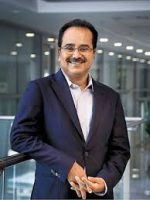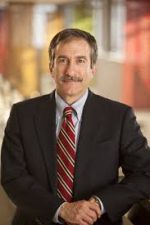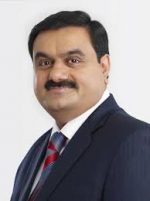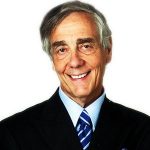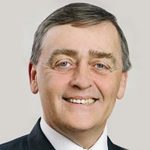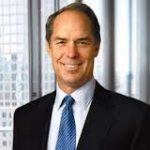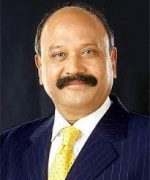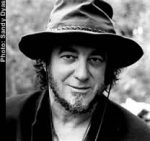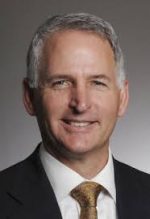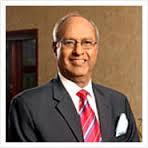G. V. Prasad is an Indian business executive, and CEO of Dr. Reddy's Laboratories. Prasad studied Chemical Engineering at the Alagappa College of Technology. After completing five semesters, he went on to the Illinois Institute of Technology in Chicago to complete the three remaining semesters. Prasad followed up the engineering degree with a one-year MBA at Purdue University. He won the 'Outstanding Senior Student' Award from the American Institute of Chemists, Chicago chapter in 1982. He earned his Masters in Industrial Administration from Purdue University a year later.
His first exposure to the world of pharmaceuticals was in 1985 with Benzex Labs, a pharmaceutical enterprise that he co-founded. Benzex was later acquired by Dr. Reddys and Prasad returned to the construction business, only to come back to pharmaceuticals in 1990 – this time as the CEO and MD of Cheminor Drugs Ltd. In 2001, Cheminor Drugs merged with Dr.Reddy's Laboratories and Prasad took over as the vice-chairman and CEO of the merged entity.
Early career:
After completing his Masters, Prasad returned to India and joined his father's construction business, immersing himself in various projects in Karnataka. In 1985, he co-founded Benzex Labs, an API manufacturing company, which was later acquired by Dr Reddy's. He briefly returned to the construction business before reappearing on the pharma landscape in 1990 as managing director of Cheminor Drugs Ltd. Fueled by a spirit of entrepreneurship, Prasad transformed Cheminor into a world class API and Generics manufacturer, largely through his focus on professionalism, good governance and transparency.
In 2001, Cheminor Drugs merged with Dr.Reddy's Laboratories and Prasad took over as the vice-chairman and CEO of the merged entity. Prasad is widely credited as the architect of Dr. Reddy's successful global generics strategy. He envisioned newer business platforms like the Custom Pharmaceutical business and Specialty pharmaceuticals and is dedicated to building the innovation side of the business.
Professional affiliations:
AP State Committee, WWF-India
Member of the Advisory Board, Acumen Fund
Member of the Board, Infotech Enterprises Ltd.
Member of the Board, Diana Hotels, India
Member of the Board, Ocimum Bio Solutions
Member, American Chemical Society
Member, American Institute of Chemical Engineers
Served as Chairman of the CII National Committee on Environment and the Intellectual Property Committee (2006–2007)
Gary Rodkin is the past CEO and President of ConAgra Foods, one of the largest food processing companies in North America. Rodkin was formerly the CEO and president of the North America division of PepsiCo from 1995 to 2005, and still is a special consultant through his exit agreement with the company. He helped PepsiCo grow in the purchasing of Quaker Oats. He also was vice president of marketing at General Mills for many years before he left for PepsiCo. Rodkin got his bachelor's in economics from Rutgers University and his M.B.A. from Harvard School of Business.
On August 12, 2014, Rodkin announced that he would be retiring as CEO in 2015.
Compensation:
While CEO of ConAgra Foods in 2009, Gary M. Rodkin earned a total compensation of $5,858,677, which included a base salary of $1,019,231, a cash bonus of $1,100,000, stocks granted of $2,126,000, options granted of $1,425,850, and other compensation totaling $187,596.
Gautam Adani (born 24 June 1962) is an Indian business tycoon who is the chairman and founder of Adani Group. According to Forbes, his personal wealth is estimated to be $7.1 billion as of September 2014. He founded The Adani Group in 1988 and today it is a globally integrated infrastructure player with businesses spanning coal trading, coal mining, oil & gas exploration, ports, multi-modal logistics, power generation, Agri Infrastructure, edible oil & transmission and gas distribution. With business experience of more than 33 years, Gautam Adani is an Indian entrepreneur who has led the Adani group from a modest background to create a $10.4 billion professionally managed empire in a relatively short period of time. He is a first generation entrepreneur. The Adani Group's business strategy has revolved heavily around excessive leverage and political patronage. As of 2015, they are one of India's most indebted business groups.
He has also been recognized for establishing the modern Mundra port which was selected as the best port in 2006 by Lloyds. Mundra Port is now India's largest commercial port to have achieved a new landmark of handling 100 million metric tonnes in FY 13-14.
Career:
Instead of joining his father’s textile unit in Ahmedabad, Gautam Adani moved to Mumbai at a young age of 18 with only a few hundred rupees. He started his career working as a diamond sorter at Mahindra Brothers for 2 years and then went on to set up his own diamond brokerage business in Mumbai, India. He has claimed that he made his first million within a year, at the age of 20, a big amount during the 1980s.
Mahasukh Adani, Gautam’s elder brother and an entrepreneur, called Gautam back to Ahmedabad to run his newly purchased plastic factory.
Soon, Gautam began commodity trading by importing Polyvinyl Chloride (PVC), a key raw material for manufacturing plastic.
Gautam Adani, referred to as 'Gautambhai', is known for his risk appetite. Former IIM-A director Bakul Dholakia, who is associated with the Adani group's educational and CSR initiatives said, "In terms of the risk taking appetite and risk absorption capacity there are very few who can match Gautam Adani. There are many who take large risks, but very few have the ability to face their adversity with courage and conviction".
Adani Group:
In 1988, he established Adani Exports Limited (now known as the Adani Enterprises Ltd), the flagship company of the Adani Group, that traded in a variety of power and agricultural commodities. The economic liberalization in 1991 fuelled the rapid growth of the business and the huge profitability of Adani Exports provided further capital for Gautam Adani to expand his business.
In 1993, the Government of Gujarat invited private companies to run the Mundra Port and in 1995 the contract was given to Adani Group. Today, Mundra Port is the largest Private Sector port in India, with capability of handling close to 80 million tonnes of cargo per annum.
Gautam Adani is also the founder and promoter of Adani Power Ltd (APL), a power business arm of Adani Group. Adani Power has thermal power plants with capacity of 4620 MW, the largest private thermal power producer of the country. It is also the largest solar power producer of India with capacity 40MW.
The group gives 3 per cent of its profits to the Adani Foundation. He is particularly proud of Adani Vidya Mandir, a school in Ahmedabad which admits only those children whose parents have an annual income less than Rs.1 lakh. The school is run by his wife Priti.
He is the President and CEO of Kaiser Francis Oil, an Anglo-American company based in Tulsa in Oklahoma. He is a graduate of the Harvard Business School.
He is the richest man in Great Britain. He is the 6th Duke of Westminster and he owns substantial number of properties. He is also the Chancellor of the University of Chester. He has estates and properties in Lancashire, Cheshire, Scotland, London, Spain and Canada.
Gerald L. Hassell (born 1952) is an American bank executive and is the Chairman and CEO of The Bank of New York Mellon.
Background:
Gerald Hassell joined the Bank of New York in 1973 when he was only 21 years old as a management trainee, and has held various positions in the credit and corporate banking divisions. He was involved in the formation and operation of the bank's Communications, Entertainment & Publishing Division, and had responsibility for strategic planning and administrative services. Prior to his appointment as president and director in 1998, during which he replaced Tom Renyi who went on to become CEO of the bank, Hassell was a senior executive vice president and chief commercial banking officer. He was also a member of the bank's Senior Policy Committee.
Education and other activities:
Hassell received a BA degree in Economics from Duke University in 1973 and an MBA in Finance from the New York University's Stern School of Business.
He is the former chairman of the Board of Visitors of The Fuqua School of Business at Duke University; a member of The Financial Services Roundtable and Financial Services Forum; a member of the board of Private Export Funding Corporation; and Vice Chairman of Big Brothers/Big Sisters of New York.
Philanthropy:
In 2012, Hassell and his wife, Anita-Agnes, donated $4 million to Duke University.
Grandhi Mallikarjuna Rao is a mechanical engineer, billionaire industrialist, and the founder chairman of GMR Group,a global infrastructure developer and operator based in India.Started in 1978, GMR Group is now present in 7 countries, active in energy, highways, large urban development and airports sectors, known for building and operating world class national assets.
Early life:
G M Rao was born on 14 July 1950, in Rajam, Srikakulam district in Andhra pradesh, India. He was born in an upper-middle-class family whose main business interests involved commodities trading and a small scale jewelry business started by his father in Rajam. After graduating from Andhra University, Rao joined the Andhra Pradesh Government as a junior engineer.
He soon entered the trading of commodities as his entrepreneurial nature made it difficult for him to stay content with a mere day job. After developing good relations with suppliers and customers in the business of commodities trading, he acquired a failing jute mill for at a bargain, this venture proved to be lucrative and allowed GM Rao is use leverage from local banks to acquire other assets. Eventually GM Rao divested his stake in a multitude of industries and started a bank named Vysya Bank in collaboration with ING.
Rao eventually diluted his stake in this business and decided to enter the business of energy and infrastructure with the proceeds from the sale. The entry into the power business allowed Rao to build what would become India leading infrastructure asset developer, as GMR's closest competitor, GVK, is 6 times smaller by market capitalization, making Rao the leader of India as an infrastructure asset developer by revenues, asset size, and market capitalization.
It is also widely accepted in top brass of the state of Andhra Pradesh that Rao's closeness with Chandra Babu Naidu allowed Rao to become the asset developer and owner for Hyderabad's International Airport Rajiv Gandhi International Airport.
Life and career records:
As per Forbes magazine, G M Rao is the richest Telugu man by sheer quantifiable wealth. He is known for his down to earth nature and simplicity despite his enormous fortune. According to media reports, GMR Group is one of India's most trusted and respect brands. GM Rao received the Economic Times Entrepreneur of the year Award in 2007.
Greg Brown (born 1960) is an American businessman. He serves as chairman and chief executive officer of Motorola Solutions.
Early life:
Greg Brown graduated from Rutgers University, where he received a Bachelor of Science in Economics in 1982.
Career:
Greg Brown is chairman and chief executive officer of Motorola Solutions, Inc. He joined Motorola in January 2003. In March 2007, Brown became president and COO and was elected to the company's board of directors. He then became CEO of Motorola in January 2008.
Prior to joining Motorola, he was chairman and CEO of Micromuse Inc. from 1999 to 2003.
Brown serves as chair of the Federal Reserve Bank of Chicago, and is a member of the executive committee of the Business Roundtable. Additionally, Brown is a board member of the Economic Club of Chicago and the Chicago Council on Global Affairs.
He earned a bachelor's degree in economics and an honorary doctorate in humane letters from Rutgers University, and also serves as chairman on the University’s board of governors.
Brown is chairman of the Rutgers board and is a member of the finance committee for New Jersey Republican Governor Chris Christie's 2016 presidential bid.
Gregory David Wasson (born October 19, 1958) is Co-Founder and President of Wasson Enterprise, a family-based investment office, and the former President and CEO of Walgreens Boots Alliance. Prior to the merger of Walgreens and Alliance Boots, Greg was President and Chief Executive Officer of Walgreen Co. (NYSE: WAG), the nation’s largest retail community pharmacy chain, which in fiscal 2014 had $76.4 billion of sales, 8,309 locations, and 251,000 employees.
Greg served as chief executive officer at Walgreens and as a member of the company’s Board of Directors from 2009 to 2014. Since joined the company in 1980, Greg was appointed to positions of increasing responsibility, including President of Walgreens Health Initiatives in 2002, Senior Vice President of Walgreens in 2004, Executive Vice President of Walgreens in 2005, and President and Chief Operating Officer of Walgreens in 2007.
Greg has served as a Director of Verizon Communications Inc. (NYSE: VZ), since March 2013 and is a member of the Audit Committee and the Human Resources Committee. As of July 2015, Greg was appointed as Director and a member of the Audit Committee of PNC Financial Services Group, Inc. (NYSE: PNC). Greg joined Health Care Service Corporation (HCSC), the largest customer-owned health insurance company, as a Director in November 2015, and in addition to serving on its Board, Wasson serves on HCSC’s Finance and Audit & Compliance committee.
In addition, Greg serves on the Trustee Board of the Museum of Science and Industry (MSI) and Board of World Business Chicago (WBA) as well as a member of The Business Council, CEO Perspective, The Economic Club of Chicago, The Commercial Club of Chicago and Chicago Club. Greg and his wife Kimberly are the 2016 co-chairs of the 36th Annual MSI Columbian Ball.
In 2015, Greg received the Sheldon W. Fantle Lifetime Achievement Award for exceptional accomplishments and contributions to the industry from National Association of Chain Drug Stores’ (NACDS) and the Grocery Manufacturers Association (GMA) honored Greg with the GMA Hall of Achievement Award. In 2016, Greg received two awards from Purdue University: the Distinguished Alumni Award in recognition of professional and endeavor achievements, and the Career Achievement Award, the pinnacle award bestowed upon alumni who have distinguished themselves through a lifetime of exemplary service in pharmacy and service to Purdue.
Previously, Greg served as a Director of AmerisourceBergen Corporation (NYSE: ABC), a leader in global pharmaceutical sourcing and distribution services, with which Walgreens has a long-term strategic relationship, and served as member of the Board of Directors of Alliance Boots GmbH, the leading international pharmacy-led health and beauty group.
Past roles include Chairman of National Association of Chain Drug Stores (NACDS), the Vice Chairman of Retail Industry Leaders Association (RILA), member of the Healthcare Leadership Council (HLC), The Wall Street Journal CEO Council, and the civic committee of the Commercial Club of Chicago, as well as being a member of the British-American Business Council International Advisory Board. In addition, Greg served many years as a board member of Consumer Goods Forum (CGF), The Field Museum, and the Midtown Educational Foundation and a member of the Illinois chapter of the American Cancer Society’s CEOs Against Cancer and co-chaired the society’s 2014 Discovery Ball.
Early life:
Wasson was born October 19, 1958 in Lafayette, Indiana, the third of five children of Richard "Dick" and Phyllis Wasson. His family lived in Delphi until he was 13, and then moved to nearby Monticello, Indiana. Wasson graduated from Twin Lakes High School.
Two of Wasson's relatives were pharmacists, and they encouraged him to study pharmacy at Purdue University. Wasson met his future wife there, also a pharmacy student. They married on their graduation day in 1981.
Gunupati Venkata Krishna Reddy, also referred to as GVK Reddy, is the Founder Chairman and Managing Director of GVK. a Hyderabad-based leading Infrastructure Conglomerate. With pioneering initiatives across energy,resources,airports,transportation,hospitality and lifesciences sectors, Dr. GVK Reddy has reaffirmed the Indian mettle on a global arena. He set up India’s first independent power plant in Andhra Pradesh, in 1997.
He has successfully executed India’s first six-lane expressway connecting Jaipur to Kishangarh in the state of Rajasthan. GVK is also the first to develop a brown field airport in Public Private Partnership (PPP) model. In one of the most significant achievements, GVK’s new iconic CSIA Terminal 2 was inaugurated at the hands of Hon’ble Prime Minister Dr. Manmohan Singh.The new T2 will is home to India’s largest public art programme(Jaya He), in the form of a 3 km multi-story Art Wall, illuminated by skylights, that has over 7000 pieces of artwork & artefacts from Maharashtra and also every region & corner of India.In yet another major achievement, GVK's Bengaluru International Airport has been renamed as Kempegowda International Airport, Bengaluru and a new terminal was inaugurated.With these two major airports being operational,GVK is set to expand in airport business both in India and abroad.
Business career:
Reddy entered into the business starting with the construction of Nagarjuna Sagar Right Canal. Nagarjuna Sagar Dam, the world’s largest masonry stone dam at the time of its construction, was built across the river Krishna in Nagarjuna Sagar, Nalgonda District of Andhra Pradesh. The dam was constructed for optimum utilization of water from river Krishna. The construction began in 1956 and was completed by 1969. Then, Reddy moved to Khammam to undertake two major construction projects – Muneru aqueduct and 100 ft. deep Venkatapaleyam deep cut canal. Then he moved upstream to Srisailam Dam project which involved the excavation of foundation for a powerhouse on the right bank.
Reddy acquired majority shareholding in Hotel Banjara, a four star hotel and became the managing director and completed the project by 1976-77. Collaboration with Holiday Inn marked his entry into the hospitality business. He also incorporated Novopan India Limited, being the first company in India to bring the Pre-laminated Particle Board Technology to manufacture Plain and Melamine Faced Particle Boards.
Dr GVK Reddy has been a pioneer in India’s infrastructure sector. Guided by his vision and leadership, GVK has successfully implemented projects in record time.
GVK set up India’s first Independent Power Project (IPP) in the private sector at Jegurupadu, Andhra Pradesh to generate 217 MW power and added another 228 MW in the second phase. GVK commissioned another power plant at Kakinada, AP, to generate 469 MW power.
GVK has successfully executed India’s first six-lane expressway connecting Jaipur to Kishangarh in the state of Rajasthan. GVK also developed a four-lane road project between Deoli and Kota in Rajasthan and developing a six-lane project between Bagodara and Vasad in Gujarat.
GVK also developed hydro power projects in the states of Uttarakhand and a thermal power project in the state of Punjab.
GVK is engaged in the operation and modernization of Mumbai’s Chhatrapati Shivaji International Airport, which has been termed as one of the most challenging infrastructure projects in the world. GVK CSIA’s new integrated Terminal 2 which commenced operations on 12 February 2014, has bagged many awards and accolades and attained an iconic status across the globe for integrating a world-class design, infrastructure and operational efficiency.
GVK is engaged in the management of Kempegowda International Airport, Bengaluru and is developing the infrastructure to meet the growing air traffic. The new Terminal at GVK KIA is at par with the best in the world with enhanced design and facilities to elevate passengers’ travel experience.
In the hospitality sector, GVK has built some of the finest luxury hotels in Hyderabad, Mumbai Chandigarh and Chennai. GVK currently owns seven 5-star hotels.
GVK has set up GVK one, a mega retail mall spread over 700,000 sq ft in Hyderabad.
GVK has acquired coal mines from Hancock Prospecting Ltd. in Queensland, Australia with total resources of about 8 billion tonne and a capacity of more than 80 million tonne per annum. The infrastructure project involves the development, ownership and operation of an integrated “pit-to-port project” consisting of a 500 km rail line and a 60 million tonne per annum port at Abbot Point.
Awards and recognition:
Dr. GVK Reddy has been bestowed with the 'Lifetime Achievement Award' at India Aviation 2014 for his contribution to Aviation Sector in the country.
Dr. GVK Reddy won Infrastructure Person of the Year award at Construction Week India awards.
Recognized as ‘PowerBrands Hall of Fame Corporate Luminary of the Year - 2012’.
Awarded Padma Bhushan - the third highest civilian award of India in 2011.
"Construction World — Man of the year 2011" award by Construction World.
"Best First Generation Entrepreneur of the Year 2010" award under the India Business Leaders Awards instituted by CNBC-TV 18.
Conferred "Entrepreneur of the Year Award 2009" from Economic Times.
Under his leadership, GVK won the "Most Promising Infrastructure Company of the year 2009"award by KPMG.
Excellence Award at the International Telugu Cultural Conference held at the Golden Jubilee celebrations of the Telugu Association of Malaysia.
Felicitated by The Telugu Literary and Cultural Association, US.
Conferred Life Membership of the World Telugu Federation, Chennai.
